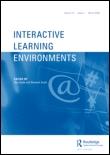
INTERACTIVE LEARNING ENVIRONMENTS
Scope & Guideline
Empowering educators with cutting-edge interactive methodologies.
Introduction
Aims and Scopes
- Interactive Learning Technologies:
The journal emphasizes the use of various interactive technologies, including virtual reality (VR), augmented reality (AR), and artificial intelligence (AI), to facilitate engaging learning experiences. - Pedagogical Innovations:
It explores new pedagogical strategies such as flipped classrooms, game-based learning, and collaborative learning to enhance student engagement and knowledge retention. - Diverse Learning Environments:
The scope includes formal, informal, and non-formal learning environments, addressing educational practices across different age groups and contexts. - Assessment and Evaluation:
The journal investigates innovative assessment methods and tools, including learning analytics and automated feedback systems, to measure learning effectiveness and improve educational practices. - Focus on Learning Outcomes:
Research on how interactive learning environments impact cognitive, emotional, and social outcomes for learners is a critical aspect of the journal's contributions.
Trending and Emerging
- Artificial Intelligence in Education:
A significant increase in publications exploring the role of AI, including chatbots and intelligent tutoring systems, in enhancing learning experiences and outcomes is evident. - Gamification and Game-Based Learning:
Research focusing on gamification strategies and serious games to boost engagement and motivation among learners has gained traction, reflecting a growing interest in playful learning. - Collaborative and Social Learning:
There is a rising emphasis on collaborative learning environments that leverage social interactions and peer feedback to enhance the learning experience. - Personalized Learning Experiences:
Emerging studies are increasingly addressing personalized learning pathways and adaptive learning technologies, showcasing the shift towards tailoring education to individual learner needs. - Integration of VR/AR Technologies:
The integration of VR and AR in educational settings is a trending topic, with research investigating their impact on experiential learning and student engagement.
Declining or Waning
- Traditional Instructional Methods:
There is a noticeable decrease in research focusing on conventional teaching methods without the integration of technology, as the emphasis shifts towards more interactive and technology-enhanced learning approaches. - General Theoretical Frameworks:
Papers centered on broad theoretical discussions without specific applications to interactive technologies or pedagogies have become less frequent, indicating a move towards more practical, application-based research. - Static Learning Environments:
Studies exploring static or non-interactive learning environments are less common, suggesting that the journal is prioritizing research that emphasizes interactivity and engagement. - Single-Discipline Focus:
Research that is limited to a single discipline or subject area is waning, as interdisciplinary approaches and the integration of technology across various fields gain more attention.
Similar Journals
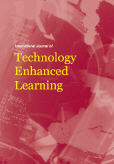
International Journal of Technology Enhanced Learning
Shaping Tomorrow's Education through Technological AdvancementsInternational Journal of Technology Enhanced Learning, published by INDERSCIENCE ENTERPRISES LTD, is a premier scholarly journal that comprehensively explores the intersection of technology and education, fostering innovative approaches to enhance learning processes. Established in 2008 and continuing through 2024, the journal is pivotal for researchers, educators, and technology professionals aiming to disseminate and engage with cutting-edge developments in technology-enhanced learning environments. With an admirable ranking in Scopus—placing in the 72nd percentile of Education and 49th in Computer Science Applications—the journal reflects a robust influence in the fields of Computer Science Applications and Education, as evidenced by its Q2 and Q3 quartile rankings. The journal not only provides a platform for empirical research and theoretical discourse but also emphasizes practical implementations in e-learning. Although it does not offer open access, its curated collection of articles serves as a vital resource for scholars and practitioners who are dedicated to advancing the nexus of technology and education.
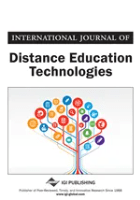
International Journal of Distance Education Technologies
Connecting Educators and Innovators in Distance LearningInternational Journal of Distance Education Technologies is a premier scholarly publication, serving as a vital resource for researchers, educators, and technology professionals focused on the evolving field of distance education. Established in 2003 and published by IGI Global, this journal addresses the intersection of educational methodologies and technological advancements, contributing significantly to knowledge in areas including e-learning, computer networks, and education sciences. With notable rankings in the 2023 quartiles, it stands out at Q1 in Education and Q2 in categories such as Computer Networks and Communications and E-learning, reflecting its influence and reach within the academic community. This journal not only provides a platform for high-quality research but also engages with contemporary issues in technology-enhanced learning, making it indispensable for anyone striving to understand and innovate in distance education. Although it does not feature Open Access options, the journal’s rigorous peer-review process ensures that each published article offers valuable insights and relevant findings in this rapidly evolving domain.

Contemporary Educational Technology
Innovating Learning for the Digital AgeContemporary Educational Technology is a premier journal published by BASTAS PUBL LTD - UK, specializing in the dynamic intersection of educational practices and technological advancements. With an E-ISSN of 1309-517X, this journal serves as a vital resource for researchers, educators, and professionals keen to explore innovative solutions and methodologies in education. Ranked in the Q2 category for both Education and Management of Technology and Innovation in 2023, Contemporary Educational Technology boasts impressive Scopus ranks, standing at #187 out of 1543 in the Social Sciences Education field, reflecting its influence and contribution to contemporary research. Through its open-access approach, this journal facilitates the dissemination of knowledge, making cutting-edge research readily available to a global audience. By examining developments from 2018 through 2024, it aims to critically analyze and promote the integration of technology in educational contexts, thereby fostering improved learning outcomes and innovative teaching practices.
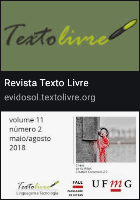
Texto Livre-Linguagem e Tecnologia
Advancing Knowledge in Linguistics and Digital Innovation.Texto Livre-Linguagem e Tecnologia is a prominent academic journal published by the Federal University of Minas Gerais, Faculty of Letters, specializing in the interdisciplinary domains of language, technology, and communication. Since its establishment, the journal has embraced an Open Access model, fostering unrestricted dissemination of research findings. With an ISSN of 1983-3652, it aims to bridge theoretical insights and practical applications in linguistics and technology, thereby enriching scholarly dialogues worldwide. The journal's recent classifications in the 2023 Category Quartiles highlight its relevance, achieving Q3 in Communication, Q4 in Computer Science Applications, and Q2 in Linguistics and Language. Additionally, it has earned respectable Scopus rankings, placing it within the 71st percentile for Language and Linguistics in the Arts and Humanities. This positions Texto Livre as a vital resource for researchers, professionals, and students keen on exploring the dynamic interplay between language and technology. By engaging with cutting-edge research, contributors and readers alike can shape the future discourse in these critical fields.
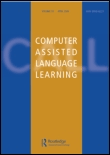
Computer Assisted Language Learning
Connecting Technology and Linguistics for Enhanced LearningComputer Assisted Language Learning is a prestigious journal dedicated to the interdisciplinary field of language education technology, published by Routledge Journals, Taylor & Francis Ltd. With its ISSN 0958-8221 and E-ISSN 1744-3210, the journal has become a cornerstone for researchers and practitioners interested in the innovative integration of computer technology in language learning processes. As of 2023, it holds an impressive impact factor, ranking Q1 in both Computer Science Applications and Linguistics and Language categories, indicating its significance within these scholarly domains. The journal covers a wide array of subjects, including language acquisition, educational technology, and instructional design, facilitating an understanding of how digital tools can enhance language learning experiences. Its rigorous editorial standards ensure that published articles undergo thorough peer review, making it a highly respected platform for disseminating cutting-edge research. With an extensive publication history dating back to 1990 and an ongoing commitment to exploring the dynamics of language learning in digital contexts, this journal is essential for academics, educators, and students alike who are looking to stay at the forefront of research in computer-assisted language education.

Education and Information Technologies
Driving educational excellence through information technology.Education and Information Technologies, published by SPRINGER, is a leading journal dedicated to the intersection of educational practices and innovative information technologies. With an impressive impact factor and consistently ranked in the Q1 quartile across Education, E-learning, and Library and Information Sciences, this journal serves as an essential resource for researchers and professionals aiming to explore the dynamic landscape of educational technology. Spanning from 1996 to 2024, it provides a platform for high-quality, peer-reviewed articles that contribute to the evolving discourse in this critical field. The journal’s rigorous Scopus ranking, placing it in the top 4% of Social Sciences Education and top 6% in Library and Information Sciences, highlights its significance in advancing scholarly knowledge. While it offers various access options, the focus remains on delivering cutting-edge research that can inform teaching practices and technological integration in education, making it indispensable for students, educators, and technology developers alike.

Chemistry Teacher International
Connecting Educators, Researchers, and PractitionersChemistry Teacher International is a prominent peer-reviewed journal dedicated to the field of chemistry education, published by WALTER DE GRUYTER GMBH. With its Open Access policy since 2018, this journal ensures that research is widely disseminated to educators, researchers, and practitioners globally. Located in Berlin, Germany, it aims to promote innovative teaching methodologies and practical applications in chemical sciences. The journal has consistently achieved a Q2 ranking in both the Chemistry (Miscellaneous) and Education categories as of 2023, reflecting its relevance and impact within the academic community. Over its converged years from 2019 to 2024, Chemistry Teacher International fosters a collaborative platform for sharing research, insights, and pedagogical strategies, thereby contributing to the advancement of chemistry education on a global scale.

Smart Learning Environments
Shaping the next generation of intelligent learning environments.Smart Learning Environments, published by Springer Heidelberg, is a leading open-access journal dedicated to advancing the field of educational technology and intelligent learning systems. Since its inception in 2014, this journal has established itself as a vital resource for researchers and practitioners, showcasing innovative interdisciplinary approaches that enhance learning experiences using smart technologies. With a notable impact factor and recognition in the top quartiles (Q1) of both Computer Science Applications and Education, it ranks within the top 2% of journals in the Social Sciences – Education category and the top 7% in Computer Science, according to Scopus. The journal's scope encompasses empirical studies, theoretical papers, and reviews, making it an essential platform for disseminating cutting-edge research. Researchers, educators, and technology professionals are encouraged to engage with this premier outlet, which not only facilitates access to high-quality research but also promotes collaboration across academic and professional spheres.

Journal of Interactive Media in Education
Unlocking the Potential of Digital Resources for EducationThe Journal of Interactive Media in Education, published by UBIQUITY PRESS LTD, stands as a prominent platform for scholars and practitioners interested in the integration of media and technology in educational contexts. With an impact factor reflective of its esteemed position—ranking in the Q1 category for Communication and Education, and Q2 for Computer Networks and Communications—this journal plays a critical role in advancing research that fosters innovative pedagogical approaches and enhances learner engagement. Established as an Open Access publication since 1996, it not only ensures wide dissemination of knowledge within the academic community but also promotes inclusivity and accessibility of educational research. With its scope ranging from interactive learning environments to the efficacy of digital resources, the journal publishes high-quality, peer-reviewed articles that contribute significantly to the fields of communication, education, and technology. Researchers, educators, and students will find this journal to be an invaluable resource for insights and developments in the dynamic field of interactive media.

Recherche et Pratiques Pedagogiques en Langues de Specialite-Cahiers de l Apliut
Advancing Research at the Intersection of Language and Education.Welcome to Recherche et Pratiques Pedagogiques en Langues de Specialite-Cahiers de l Apliut, a distinguished journal published by the ASSOC PROFESSEURS LANGUES IUT-APLIUT in France. Focused on the critical intersection of education and linguistics, this journal aims to disseminate innovative research and practices in the field of specialized languages and pedagogy. With its ISSN 2257-5405 and E-ISSN 2119-5242, it serves as a vital platform for educators, researchers, and students to explore effective teaching methodologies and language acquisition strategies. The journal has garnered recognition in various categories, currently ranked Q4 in Education and Q3 in Linguistics and Language for 2023, highlighting its emerging contribution to the field. Although it operates without an open access option, its focused studies and implications for educational practices ensure that critical insights are accessible to professionals seeking to enhance their understanding and application of language education. Join a community committed to advancing pedagogical approaches in specialized languages through the insights provided in this journal, bridging theoretical frameworks and practical applications from 2011 to 2019 and continuing from 2021 to 2024.